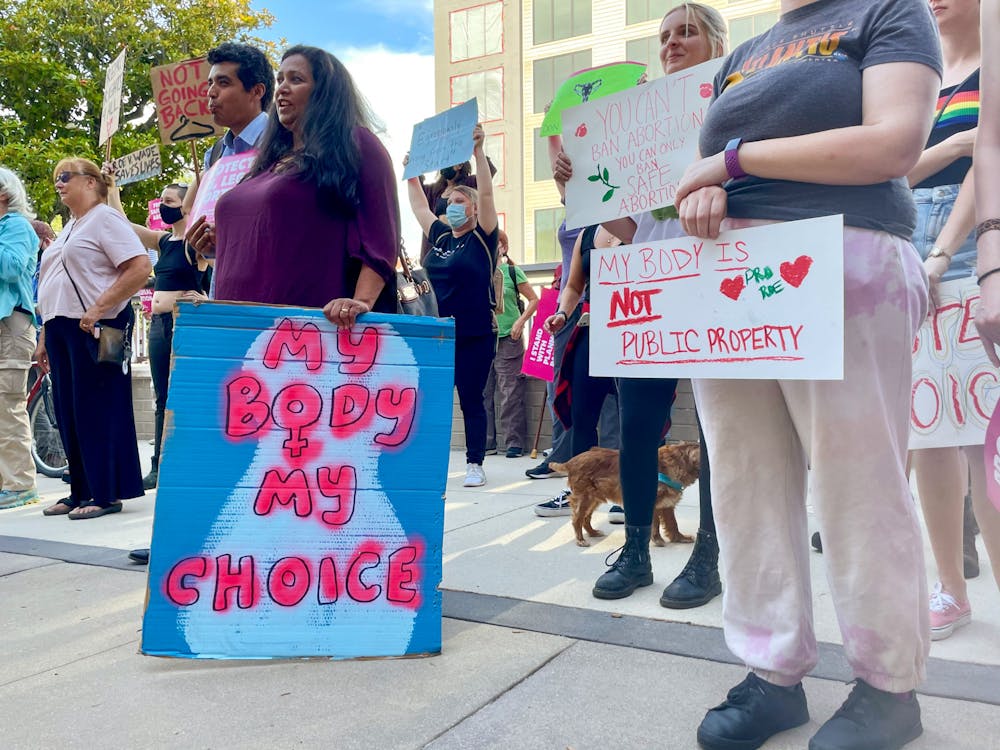Students and medical staff at UF have raised concerns about the future of abortion education after reports Roe v. Wade — a Supreme Court case that protects the right to abortion — may be overturned. Florida laws may limit future abortion practices and access to clinical trainings.
A leaked Supreme Court draft from Justice Samuel Alito, published May 2 by POLITICO, would give states power over abortion legislation and dictate what physicians can provide. The draft sparked protests across the nation and in Gainesville last week.
Tina O’Shea, a clinical assistant professor in the College of Medicine’s department of obstetrics and gynecology, said the college is obligated to educate students about family planning, including contraception and abortion. She said she thought obstetric medical education would be impacted if abortion is criminalized.
The UF College of Medicine does not teach medical students how to physically terminate pregnancies, but the curriculum does cover reasons, methods and impacts of abortions.
If medical students aren’t able to learn about performing abortions, O’Shea said, they will not have a complete understanding of women’s health care.
Areisa Peters, a 28-year-old resident physician at UF’s department of obstetrics and gynecology, studied family planning and performed in-clinic abortions at the Indiana University School of Medicine
Peters chose UF because of its promise to teach her how to perform abortions with organizations in the city.
She said the overturn of Roe v. Wade would hinder students in the medical field and harm those in marginalized communities who may not understand what medical care they need. Peters also said it would be detrimental to healthcare education; students would not know how to manage potentially life-saving events.
She said she fears abortions may become less accessible if harassment outside clinics increases and physicians quit their jobs due to safety concerns.
“It’s not just a theoretical, ideological issue,” Peters said. “It has real repercussions for people who actually want to help women.”
John Smulian, the chair of the College of Medicine’s department of obstetrics and gynecology, said he does not believe the overturn would affect UF.
Smulian said he doesn’t foresee any major changes in the curriculum’s guidance provided by the Association of Professors of Gynecology and Obstetrics.
APGO collaborates with universities across the U.S. and Canada to provide teaching tools to physician educators. They recommend students — regardless of their personal views on abortion — learn about pregnancy termination, techniques and safety measures as a part of the student curriculum, Smulian said.
If Roe v. Wade were overturned, the medical school would have to comply with whatever legislative decisions Florida makes, Smulian said.
Florida’s current laws prohibit abortions past the third trimester, as early as 24 weeks into pregnancy, unless deemed necessary for the health of the mother or child. A more recent Florida bill approved in April and taking effect July 1 will make abortion illegal after 15 weeks, unless medically necessary.
Ishana Shetti, a 29-year-old post-graduate in her third year of OB-GYN residency at UF, learned about abortion in medical school at the University of South Florida and rotated through Planned Parenthood clinics in Tampa.
She said she fears hands-on experience would no longer exist if Roe v. Wade is overturned.
“Most of us are more concerned in just what it means for our patients, what it means for them in the long run in terms of the pregnancy,” Shetti said.
Contact Lillian Lawson at llawson@alligator.org. Follow her on Twitter @LillianLLawson.






